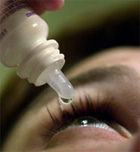How To Get Rid Of Conjunctivitis
Treatment
There are times when it is important to seek medical care for conjunctivitis (pink eye). However, this is not always necessary. To help relieve some of the inflammation and dryness caused by conjunctivitis, you can use cold compresses and artificial tears, which you can purchase over the counter without a prescription. You should also stop wearing contact lenses until your eye doctor says it's okay to start wearing them again. If you did not need to see a doctor, do not wear your contacts until you no longer have symptoms of pink eye.
When to Seek Medical Care
You should see a healthcare provider if you have conjunctivitis along with any of the following:
- pain in the eye(s)
- sensitivity to light or blurred vision that does not improve when discharge is wiped from the eye(s)
- intense redness in the eye(s)
- symptoms that get worse or don't improve, including pink eye thought to be caused by bacteria which does not improve after 24 hours of antibiotic use
- a weakened immune system, for example from HIV infection, cancer treatment, or other medical conditions or treatments
Newborns with symptoms of conjunctivitis should be seen by a doctor right away.
Viral Conjunctivitis
Most cases of viral conjunctivitis are mild. The infection will usually clear up in 7 to 14 days without treatment and without any long-term consequences. However, in some cases, viral conjunctivitis can take 2 to 3 weeks or more to clear up.
A doctor can prescribe antiviral medication to treat more serious forms of conjunctivitis. For example, conjunctivitis caused by herpes simplex virus or varicella-zoster virus. Antibiotics will not improve viral conjunctivitis; these drugs are not effective against viruses.
Bacterial Conjunctivitis

Mild bacterial conjunctivitis may get better without antibiotic treatment and without causing any complications. It often improves in 2 to 5 days without treatment but can take 2 weeks to go away completely.
Your doctor may prescribe an antibiotic, usually given topically as eye drops or ointment, for bacterial conjunctivitis. Antibiotics may help shorten the length of infection, reduce complications, and reduce the spread to others. Antibiotics may be necessary in the following cases:
- With discharge (pus)
- When conjunctivitis occurs in people whose immune system is compromised
- When certain bacteria are suspected
Talk with your doctor about the best treatment options for your infection.
Allergic Conjunctivitis
Conjunctivitis caused by an allergen (such as pollen or animal dander) usually improves by removing the allergen from the person's environment. Allergy medications and certain eye drops (topical antihistamine and vasoconstrictors), including some prescription eye drops, can also provide relief from allergic conjunctivitis. In some cases, your doctor may recommend a combination of drugs to improve symptoms. Your doctor can help if you have conjunctivitis caused by an allergy.
How To Get Rid Of Conjunctivitis
Source: https://www.cdc.gov/conjunctivitis/about/treatment.html
Posted by: ramirezcating1942.blogspot.com

0 Response to "How To Get Rid Of Conjunctivitis"
Post a Comment